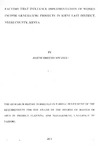| dc.description.abstract | The study sought to assess to what extent level of education, access to credit, role of management and cultural values and norms affected implementation of women projects in Nyeri County, specifically Kieni east District where the study was carried out. The Kieni East District is classified as Semi Arid (ASAL) zone and a hardship area concerns of about gender disparities within education has been long standing in many parts of the world(Davies, 1990, Shakeshaft 1995).
The study aimed at determining the extent to which level of education, access to credit, cultural values and norms and roles of management influence implementation of women income generating projects in Kieni East. The study would be valuable to members of Micro Credit Self Help Groups and projects in rural areas because it will make them aware of the importance of education and training, access to education and its availability through government, non governmental organizations, other funding agents open to them. The financial management would help them in planning their income generating projects. The Youth and male counterparts may also adopt the findings when projects are successfully implemented they would help in poverty reduction especially among women. It would also open suggestions for further research.
The main objective of this study was to find out the factors that influence implementation of women income generating projects in Kenya with special reference to Nyeri County, specifically Kieni East District. The research adopted a descriptive survey research design to investigate the factors that influence implementation of women income generating projects. The study used purposive sampling as well as random sampling technique. The target population in the study consisted all the women and Micro-credit self Help Groups registered with the Ministry of Gender and Social services as well as other women projects registered in the area. Data collected was analyzed and presented in form of tables that show the changes in variables and whether there is any correlation between the changes in the independent and dependent variables.
The study found out that implementation of women income generating projects was highly affected by level of education, access to credit, cultural values and roles of management. The study recommended that the management of women projects should endeavor to give attention to access to credit, education and training, managerial roles in the groups or projects and cultural values and norms which were noted to have considerable effects on implementation of Women projects that are income generating. | en_US |

